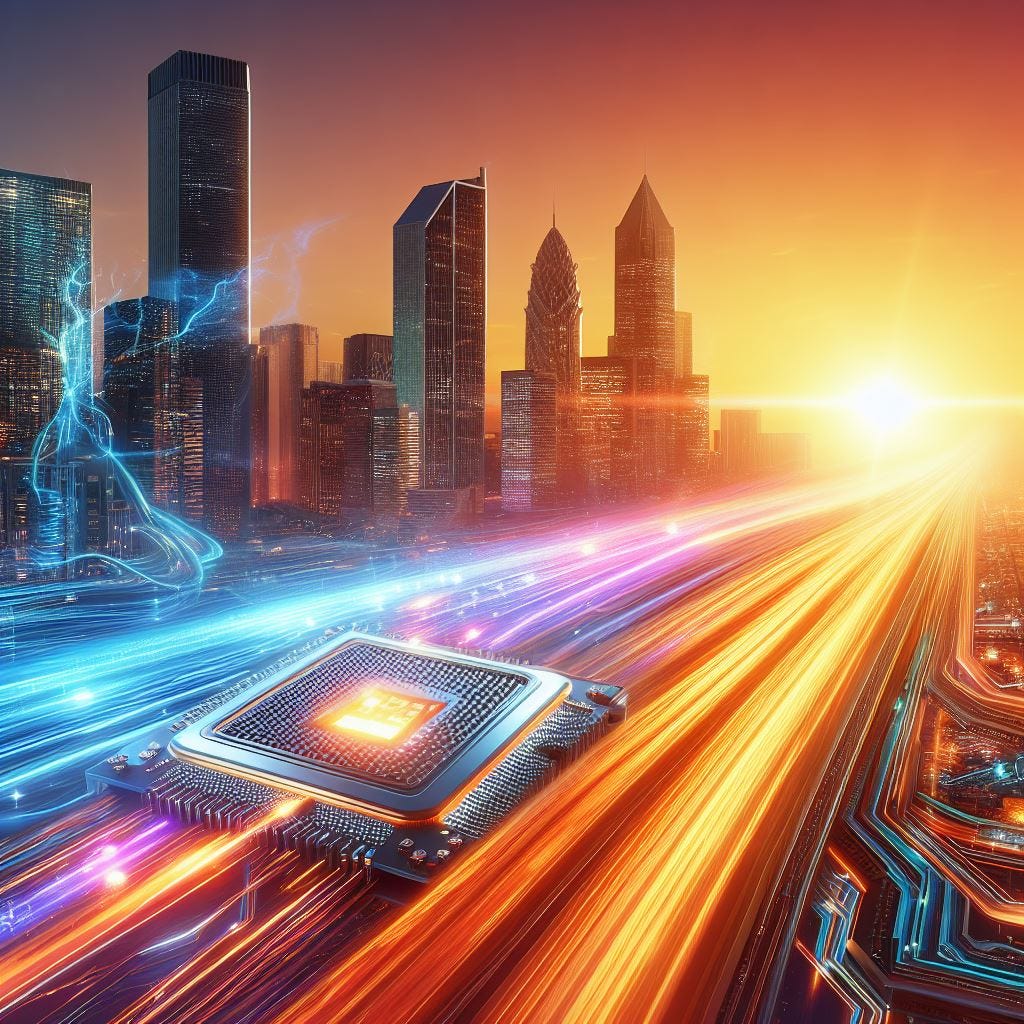The AI Race is Heating Up: Generative AI, PC CPUs, and Data Center Chips
Generative AI took center stage last week with OpenAI's first ever Dev Day event. While generative AI like ChatGPT has captured mainstream attention and imagination, the pace of progress shows no signs of slowing down. In fact, OpenAI revealed their latest model, GPT-4 Turbo, which comes with major upgrades in capability, reliability, and affordability.
This has huge implications not just for consumers, but also for the hardware powering these models both in data centers and at the edge. The CPU market for PCs is poised for disruption from new ARM-based entrants, while Nvidia and AMD battle for data center dominance. Let's break down the key developments and investing implications.
OpenAI's GPT-4 Turbo - The Next Phase of Generative AI
OpenAI gave a sneak peek of the future with GPT-4 Turbo. With a context window 16x larger, it can now remember a 300 page book! GPT-4 Turbo also provides deterministic outputs, improved knowledge cutoff to April 2023, multimodal abilities like image/audio inputs and outputs, higher rate limits, and a significantly cheaper pricing structure.
This combination of enhanced capabilities and affordability promises to accelerate adoption of generative AI across consumers, developers, enterprises, and creators. GPT-powered "AI agents" were also unveiled, that can take customized actions via APIs, essentially becoming the next generation of apps. OpenAI even announced a GPT App Store, where people can share agents and receive revenue share on usage.
The generative AI train is clearly picking up speed. With over 100 million weekly users already on ChatGPT and a clear path to monetization, it’s hard to continue calling this technology a fad. The major cloud providers are betting billions on this trend being the future. While it may still be early innings, expect increasing enterprise usage to drive real value creation and tangible financial upside.
ARM CPUs Storming The PC Market
The CPU market for PCs and laptops has been dominated by x86 chips from Intel and AMD. However, major moves by Apple, Qualcomm and others demonstrate ARM chips are ready to take a big chunk of this market, especially for mobile and battery-powered devices.
Qualcomm just announced their Snapdragon X Elite processor, which matches Apple's M2 chips in performance but uses 30% less power. This bodes very well for Windows-based ARM laptops to compete head-to-head with Apple's MacBooks over the next couple years.
Meanwhile, Nvidia and AMD plan to launch ARM-based CPUs in 2025. The performance per watt advantages of ARM align perfectly with trends like 5G connectivity and AI edge computing. Qualcomm and Apple seem poised to lead this transition, with their expertise in mobile chips and tightly integrated ecosystems.
However, don't count Intel and AMD out. They are still powerhouses, especially in the high performance segments of the PC market. The real winners here will be consumers, as more competition drives faster innovation and more choice.
Data Center Competition Heats Up
Nvidia has dominated data center AI training with their H100 GPUs. However, competitors like AMD, Intel and Qualcomm are gearing up to grab a piece of this lucrative market, especially on the inference side.
AMD's next-gen MI300 GPUs are forecasted to quickly ramp up to $1 billion in sales. Intel's Ponte Vecchio chips already show superiority over Nvidia for certain multimodal AI workloads. And Qualcomm's Cloud AI 100 chip exceeds Nvidia's performance for inference by 2x.
Make no mistake though, Nvidia's still in the lead here. Their full-stack AI data center platform provides a huge competitive advantage. Plus, Nvidia's own advances like the Hopper Superchips coming in 2024 keep pushing the envelope. However, there's ample market opportunity for other players, as demand for AI compute explodes.
Rather than winner takes all, we'll likely see specialization emerge around training vs. inference workloads, specific model types, and performance vs. cost optimizations. In this world, Nvidia may offer the premium high performance option, while AMD, Intel and Qualcomm can successfully target more cost-conscious or niche segments.
Investing Takeaways
Generative AI, ARM-based PC processors, and data center chips represent the next major platforms in technology. It's still early days though, so expect rapid change. Here are some key investing implications:
- Cloud providers like Microsoft Azure, AWS and Google Cloud are primed to monetize generative AI. Look for surging revenue in 2024.
- Qualcomm and Apple are ahead of the curve on ARM laptop processors. Short Intel and AMD as they play catchup.
- Nvidia remains the leader in data center AI training, but AMD, Intel and Qualcomm chips will nibble away market share.
- PC and data center chip suppliers like Taiwan Semiconductor (TSM) and Applied Materials (AMAT) also stand to benefit enormously.
The hardware and software powering artificial intelligence is reaching new levels of sophistication and scalability. As this technology proliferates through consumers, businesses and infrastructure, we'll see tangible financial upside across the ecosystem. Buckle up, the AI race is just getting started!
Hope you enjoyed this analysis of the latest developments. What companies and trends are you most excited about in AI? Let me know what you think!
Your own personal army of bots, continuously producing VIDEO CONTENT across all social media platforms.
Generating TRAFFIC, LEADS, and attracting CLIENTS, all for YOU!
Sit back, RELAX. Let Artificial Intelligence do the heavy lifting FOR YOU.
Your business transformed, a powerhouse of wealth, forging a secure future for you and your family.
But BEWARE… Those hesitant to adopt AI risk falling behind, their income dwindling, struggling to provide…
Don’t get left behind! Embrace the future.
Join our AI Creators Club.
*All images above were generated with AI
Add To Cart
Your initial payment will be $1.
After 30 days, your subscription will be renewed monthly at $37/month.
You are basically are getting access to everything for only $1 for an entire month.
No contract, no obligations. You can cancel any time.












